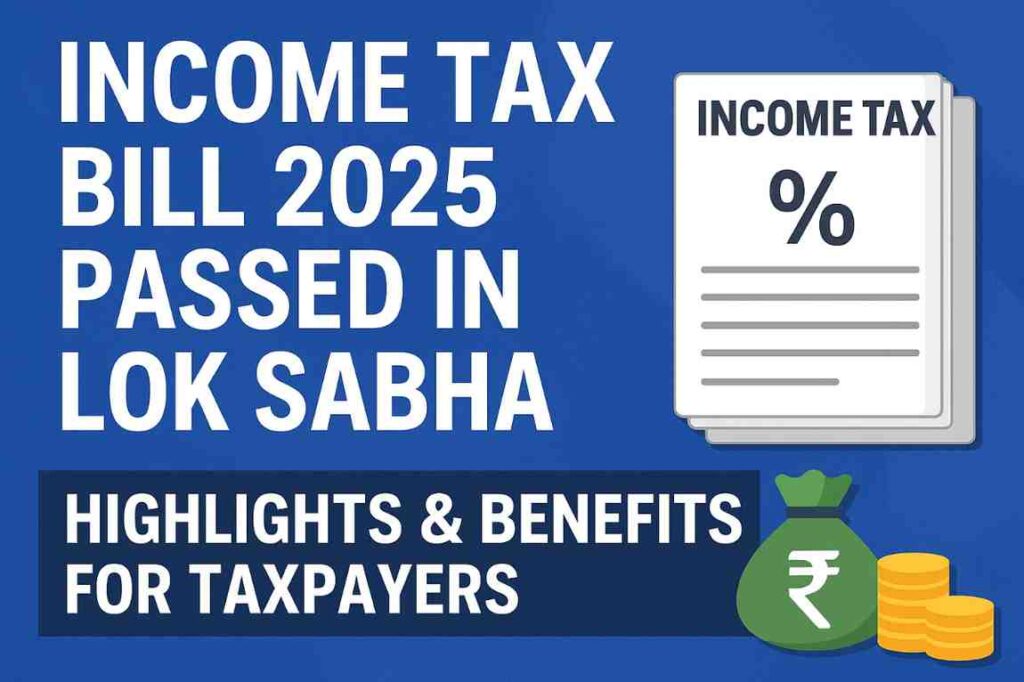
The Income Tax Bill 2025 has officially been passed in the Lok Sabha without debate, marking one of the biggest tax law reforms in decades. Finance Minister Nirmala Sitharaman reintroduced the Income-Tax (No. 2) Bill 2025 after making important changes based on the recommendations of the Lok Sabha Select Committee. This new bill will replace the six-decade-old Income Tax Act, 1961.
Along with this, the Taxation Laws (Amendment) Bill was also approved, granting tax exemptions to subscribers of the Unified Pension Scheme. Both bills were passed through a voice vote despite strong Opposition protests.
Why the New Income Tax Bill 2025 Was Introduced
The Income Tax Act, 1961 has been in place for over 60 years but is often considered complex and outdated. The Income Tax Bill 2025 has been designed to simplify the language of the law, reduce unnecessary litigation, and adapt to the needs of the digital economy.
The government has included almost all recommendations from the Select Committee, plus feedback from industry experts and taxpayers
Major Changes in the Income Tax Bill 2025
The new bill has 536 sections and 16 schedules arranged in a clean, structured format. Key updates include:
- Single Tax Year – Replaces “Previous Year” and “Assessment Year” with one unified term: “Tax Year.”
- Simplified Language – Easier to read and understand for everyday taxpayers.
- Removal of Contradictions – Outdated or conflicting provisions have been deleted to prevent legal disputes.
- Digital-Ready Rules – CBDT has more power to create rules suitable for modern, technology-driven systems.
Key Recommendations Accepted from the Select Committee
The Select Committee reviewed the bill for four months, producing a 4,500-page report with over 285 recommendations. Many of these have been implemented, including:
- Flexible Tax Refunds – Even late return filers can claim refunds.
- Dividend Relief – ₹80M deduction for inter-corporate dividends reinstated.
- NIL-TDS Certificates – Taxpayers with no liability can get an advance NIL-TDS certificate.
- Vacant House Tax Relief – No tax on “notional rent” for empty houses.
- Property Deduction Clarity – Standard 30% deduction after municipal tax plus interest deduction on rented properties.
- Simplified Compliance Rules – Clearer provisions for TDS on PF withdrawals, advance ruling fees, and penalties.
- Aligned MSME Definition – Matches MSME Act definitions.
- Extended Pension Benefits – Non-employees can also claim commuted pension deduction.
Experts’ Reactions to the Income Tax Bill 2025
Tax experts have generally welcomed the Income Tax Bill 2025.
Rajesh Gandhi, Partner at Deloitte India, praised the clearer structure for tax benefits to foreign pension and sovereign funds investing in infrastructure but suggested further expansion of benefits to unlisted bonds, dividend reinvestments, and certain share transfers.
Dinesh Kanabar, CEO of Dhruva Advisors, highlighted the removal of Alternate Minimum Tax for LLPs, relaxed rules for charitable trusts, and simpler transfer pricing definitions. He called it a “set of very welcome changes” that show the government listened to feedback.
Impact of the Income Tax Bill 2025 on Taxpayers
For individuals and businesses, the Income Tax Bill 2025 promises a simpler, more transparent, and less burdensome tax process. By reducing compliance complexity and removing outdated clauses, the government hopes to improve tax compliance and cut down on disputes.
If implemented well, the bill could modernize India’s tax system and make it more in line with global standards.
Bottom Line: The Income Tax Bill 2025 is a historic reform aimed at simplifying taxation in India. Understanding its provisions will be essential for making the most of the new system, whether you’re a salaried employee, business owner, or investor.
Frequently Asked Questions on Income Tax Bill 2025
Q1: What is the Income Tax Bill 2025?
The Income Tax Bill 2025 is a new law passed in the Lok Sabha to replace the old Income Tax Act, 1961. It simplifies tax rules, reduces disputes, and introduces a single “Tax Year” concept.
Q2: When was the Income Tax Bill 2025 passed?
The bill was passed in the Lok Sabha in August 2025 without debate, along with the Taxation Laws (Amendment) Bill.
Q3: What are the major changes in the Income Tax Bill 2025?
Key changes include simpler language, removal of contradictory provisions, digital-friendly rules, flexible tax refunds, and relief from tax on vacant houses.
Q4: How does the Income Tax Bill 2025 benefit taxpayers?
It makes tax compliance easier, provides clearer deductions, and reduces the risk of legal disputes. It also extends pension benefits and reinstates dividend relief for businesses.
Q5: Will the Income Tax Bill 2025 change how I file returns?
Yes, it introduces a single “Tax Year” and simplified provisions, making filing returns more straightforward for individuals and businesses.

